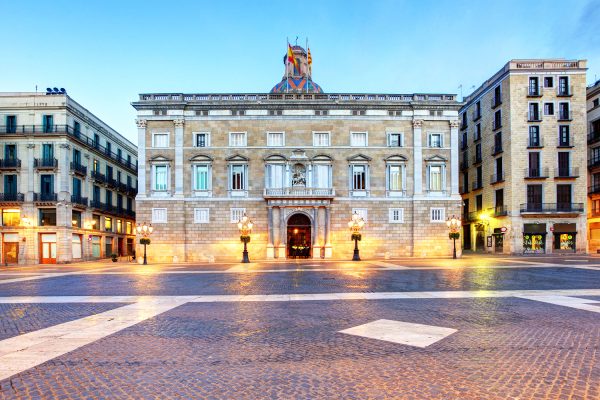
Successive Spanish governments have treated Catalan separatism as a legal, rather than a political, problem. This has done nothing to weaken support for independence. It has radicalized Catalans.
The dismissal of Catalan president Quim Torra is the latest episode in a decade-long legal drama. Spain’s Supreme Court removed him from office on Monday for hanging a “partisan” banner from the balcony of his government’s medieval palace in the center of Barcelona during the 2019 election.
The banner didn’t express support for a political party, but rather called for the release of the nine separatists who were imprisoned for leading a failed breakaway from Spain in 2017.
Torra’s removal triggers early elections, which polls predict the separatists will win.
He is the second Catalan president in three years to be unseated by the Spanish judiciary. His predecessor, Carles Puigdemont, was ousted after leading the 2017 independence bid. He fled to Belgium to escape prosecution.
Lawfare
Spain’s conservative People’s Party, which has alternated in power with the center-left Socialists since the country’s transition to democracy, made a deliberate decision to judicialize its opposition to Catalan self-rule.
When a Socialist government formalized Catalonia’s autonomy in 2006, the People’s Party, led by Mariano Rajoy, contested the statute in the courts. The Constitutional Court — stacked with People’s Party appointees — ruled four years later that the statute had gone too far. Justices rewrote fourteen articles and reinterpreted 27 more, including those pertaining to Catalonia’s fiscal and language policies. They also ruled that the statute’s description of Catalonia as a “nation” had no legal standing.
The ruling provoked mass demonstrations. At least one million Catalans, on a population of 7.5 million, took to the streets of Barcelona. Support for independence, which had hovered around 30 percent until then — or even lower when the option of becoming a federal state inside Spain was offered — shot up to 40-50 percent.
Yet the People’s Party, by now in power, doubled down on its lawfare strategy. Rajoy, as prime minister, ignored pleas from centrist Catalan leaders for more autonomy. He refused to even negotiate. Instead, his government initiated a secret, illegal, multiyear effort to discredit Catalan politicians.
In 2014, the Constitutional Court stopped Catalan president Artur Mas from organizing an independence referendum. When Mas instead held an “advisory” vote — which opponents of independence boycotted — he was convicted of abuse of power and banned from holding public office for a decade.
In 2017, the court again tried to stop Catalonia from holding a referendum. Mas’ successor, Puigdemont, ignored the judges. Unionists again boycotted the vote, but Puigdemont nevertheless claimed the result — 92 percent in favor — as a mandate to break away from Spain.
It was only then that Rajoy intervened: by deploying riot police and revoking Catalonia’s autonomy. Puigdemont, his cabinet and the leaders of the two largest pro-independence organizations were charged with rebellion and sedition. Puigdemont fled. Many other ministers were arrested and sentenced to between nine and thirteen years in prison. Catalan demonstrations against Spanish rule turned violent for the first time. Rioters battled with police in Barcelona for days.
Polarized
Support for separatist parties has been stable at 45-48 percent since 2010.
What has changed is that both separatists and unionists have become more radical in their views.
Catalan and Spanish identities, which used to overlap, are now polarized. Separatists used to reject violence. Now a majority believes violence is needed for Catalonia to become an independent state.
In the rest of Spain, opposition to Catalan nationalism has hardened. One in two Spaniards believe the region has too much, rather than too little, self-government. 15 percent voted in the last election for Vox (Voice), a neo-Francoist party that wants to dismantle Spain’s quasi-federalist system altogether. The People’s Party, far from rethinking its strategy, has argued Catalan home rule should be suspended.
Hope
The hope is that the Socialists, who returned to power in 2018, can find a middle ground. Party leader Pedro Sánchez understands that the Catalan problem demands a political, not a legal, solution. He promised talks about more autonomy, which convinced one of the three Catalan separatist parties to support him in Congress. A plurality of Catalans would still prefer an alternative to either the status quo or secession.
But talks were postponed before they could even get started when COVID-19 hit Spain. To cope with the pandemic, Sánchez, who doesn’t have a stable majority in Congress, reached out to the right. Moderate Catalan nationalists are losing hope. Hardliners argue they were right to mistrust Sánchez from the start. Torra’s removal is the latest in a long line of injustices that tells them there is no future for Catalonia in Spain.
